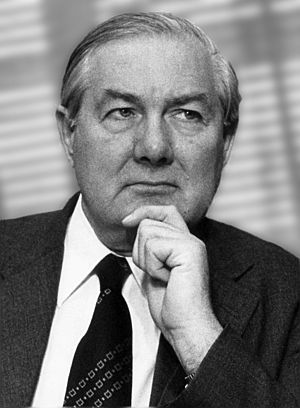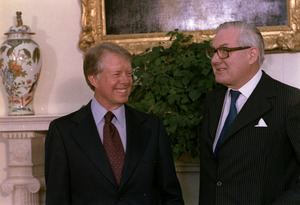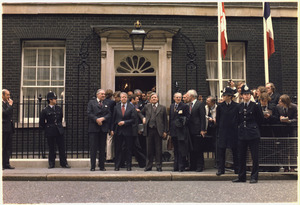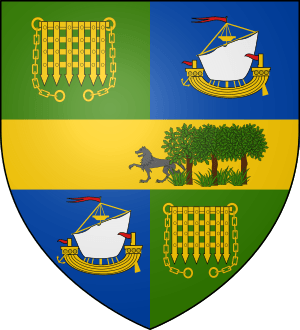James Callaghan facts for kids
Quick facts for kids
The Lord Callaghan of Cardiff
|
|||||||||||||||||||||||||||||||||||||||||||||
|---|---|---|---|---|---|---|---|---|---|---|---|---|---|---|---|---|---|---|---|---|---|---|---|---|---|---|---|---|---|---|---|---|---|---|---|---|---|---|---|---|---|---|---|---|---|

Callaghan in 1975
|
|||||||||||||||||||||||||||||||||||||||||||||
| Prime Minister of the United Kingdom | |||||||||||||||||||||||||||||||||||||||||||||
| In office 5 April 1976 – 4 May 1979 |
|||||||||||||||||||||||||||||||||||||||||||||
| Monarch | Elizabeth II | ||||||||||||||||||||||||||||||||||||||||||||
| Preceded by | Harold Wilson | ||||||||||||||||||||||||||||||||||||||||||||
| Succeeded by | Margaret Thatcher | ||||||||||||||||||||||||||||||||||||||||||||
| Leader of the Opposition | |||||||||||||||||||||||||||||||||||||||||||||
| In office 4 May 1979 – 10 November 1980 |
|||||||||||||||||||||||||||||||||||||||||||||
| Monarch | Elizabeth II | ||||||||||||||||||||||||||||||||||||||||||||
| Prime Minister | Margaret Thatcher | ||||||||||||||||||||||||||||||||||||||||||||
| Deputy | Michael Foot | ||||||||||||||||||||||||||||||||||||||||||||
| Preceded by | Margaret Thatcher | ||||||||||||||||||||||||||||||||||||||||||||
| Succeeded by | Michael Foot | ||||||||||||||||||||||||||||||||||||||||||||
| Leader of the Labour Party | |||||||||||||||||||||||||||||||||||||||||||||
| In office 5 April 1976 – 10 November 1980 |
|||||||||||||||||||||||||||||||||||||||||||||
| Deputy | Michael Foot | ||||||||||||||||||||||||||||||||||||||||||||
| Preceded by | Harold Wilson | ||||||||||||||||||||||||||||||||||||||||||||
| Succeeded by | Michael Foot | ||||||||||||||||||||||||||||||||||||||||||||
| Foreign Secretary | |||||||||||||||||||||||||||||||||||||||||||||
| In office 5 March 1974 – 8 April 1976 |
|||||||||||||||||||||||||||||||||||||||||||||
| Prime Minister | Harold Wilson | ||||||||||||||||||||||||||||||||||||||||||||
| Preceded by | Alec Douglas-Home | ||||||||||||||||||||||||||||||||||||||||||||
| Succeeded by | Anthony Crosland | ||||||||||||||||||||||||||||||||||||||||||||
| Home Secretary | |||||||||||||||||||||||||||||||||||||||||||||
| In office 30 November 1967 – 19 June 1970 |
|||||||||||||||||||||||||||||||||||||||||||||
| Prime Minister | Harold Wilson | ||||||||||||||||||||||||||||||||||||||||||||
| Preceded by | Roy Jenkins | ||||||||||||||||||||||||||||||||||||||||||||
| Succeeded by | Reginald Maudling | ||||||||||||||||||||||||||||||||||||||||||||
| Chancellor of the Exchequer | |||||||||||||||||||||||||||||||||||||||||||||
| In office 16 October 1964 – 30 November 1967 |
|||||||||||||||||||||||||||||||||||||||||||||
| Prime Minister | Harold Wilson | ||||||||||||||||||||||||||||||||||||||||||||
| Preceded by | Reginald Maudling | ||||||||||||||||||||||||||||||||||||||||||||
| Succeeded by | Roy Jenkins | ||||||||||||||||||||||||||||||||||||||||||||
|
|||||||||||||||||||||||||||||||||||||||||||||
|
|||||||||||||||||||||||||||||||||||||||||||||
|
|||||||||||||||||||||||||||||||||||||||||||||
| Personal details | |||||||||||||||||||||||||||||||||||||||||||||
| Born |
Leonard James Callaghan
27 March 1912 Portsmouth, England |
||||||||||||||||||||||||||||||||||||||||||||
| Died | 26 March 2005 (aged 92) Ringmer, East Sussex, England |
||||||||||||||||||||||||||||||||||||||||||||
| Political party | Labour | ||||||||||||||||||||||||||||||||||||||||||||
| Spouse |
Audrey Moulton
(m. 1938; died 2005) |
||||||||||||||||||||||||||||||||||||||||||||
| Children | 3, including Margaret Jay | ||||||||||||||||||||||||||||||||||||||||||||
| Signature | |||||||||||||||||||||||||||||||||||||||||||||
| Military service | |||||||||||||||||||||||||||||||||||||||||||||
| Branch/service | Royal Navy | ||||||||||||||||||||||||||||||||||||||||||||
| Rank | Lieutenant | ||||||||||||||||||||||||||||||||||||||||||||
James Callaghan (born Leonard James Callaghan, 27 March 1912 – 26 March 2005) was a British politician. He was the Prime Minister of the United Kingdom from 1976 to 1979. He also led the Labour Party from 1976 to 1980.
Callaghan is famous for being the only person to have held all four of the "Great Offices of State". These are the most important jobs in the British government. He was the Chancellor of the Exchequer (in charge of the country's money) from 1964 to 1967. Then he was the Home Secretary (in charge of law and order) from 1967 to 1970. Later, he became the Foreign Secretary (in charge of relations with other countries) from 1974 to 1976. He was a Member of Parliament (MP) for 42 years, from 1945 to 1987.
Born into a working-class family in Portsmouth, Callaghan left school at a young age. He started his career as a tax inspector. In the 1930s, he became a trade union official. During World War II, he served as a lieutenant in the Royal Navy.
He was first elected to Parliament in 1945. He was known for being on the left side of the Labour Party at first. Later, he moved more towards the right. He was seen as someone who kept strong ties between the Labour Party and trade unions.
After Labour won the 1964 election, Callaghan became Chancellor of the Exchequer. This was a difficult time for the British economy. He had to deal with money problems and attacks on the value of the pound sterling. In 1967, the government decided to reduce the value of the pound. After this, Callaghan became Home Secretary. In this role, he sent the British Army to support the police in Northern Ireland.
When Labour won the 1974 election, Callaghan became Foreign Secretary. He worked on new terms for Britain's membership in the European Communities (EC). He strongly supported Britain staying in the EC in the 1975 referendum.
In 1976, Prime Minister Harold Wilson retired. Callaghan was chosen as the new leader of the Labour Party. He became Prime Minister on 5 April 1976.
Contents
Early Life and Start in Politics
James Callaghan was born in Portsmouth, England, on 27 March 1912. His father, also named James Callaghan, was a Chief Petty Officer in the Royal Navy. His mother was Charlotte Callaghan.
He went to Portsmouth Northern Secondary School. In 1929, he finished school but could not afford to go to university. Instead, he took an exam to work for the government.
At 17, Callaghan started working as a clerk for the Inland Revenue, which collects taxes. He helped create a trade union for tax officers. In 1934, he moved to London for his job. In 1936, he became a full-time official for the Inland Revenue Staff Federation union. He then left his government job.
His union work connected him with Harold Laski, a Labour Party leader. Laski encouraged him to run for Parliament.
During World War II, Callaghan joined the Royal Navy Volunteer Reserve in 1942. He served in the East Indies Fleet and became a Lieutenant in 1944. He wrote a service manual for the Royal Navy called The Enemy Japan. Callaghan was the last British prime minister to have served in the armed forces. He was also the only one to serve in the navy.
While on leave, Callaghan was chosen to be a candidate for Parliament in Cardiff South. He won the local party vote by a small margin. In 1945, after the war ended in Europe, he returned to the UK for the general election.
Parliament and Government Roles (1945–1976)
The Labour Party won a huge election victory on 26 July 1945. Clement Attlee became Prime Minister. Callaghan won his seat in Cardiff South. He kept a seat in the Cardiff area until 1987. He promised to quickly bring soldiers home and build new homes.
Callaghan became Parliamentary Secretary to the Ministry of Transport in 1947. He helped improve road safety, introducing zebra crossings and extending the use of cat's eyes. From 1950, he worked for the Admiralty, which managed the navy.
When Labour was not in power from 1951 to 1964, Callaghan was popular with other Labour MPs. He was elected to the Shadow Cabinet every year. He became a strong supporter of the right wing of the Labour Party. He ran for Deputy Leader in 1960 but lost. In 1961, he became the Shadow Chancellor, speaking for the party on money matters. When the Labour leader Hugh Gaitskell died in 1963, Callaghan ran for leader but came third. Harold Wilson won that election.
Chancellor of the Exchequer (1964–1967)
In October 1964, Labour won the general election, and Harold Wilson became Prime Minister. Wilson quickly made Callaghan the Chancellor of the Exchequer. This meant Callaghan was in charge of the country's finances.
Britain faced big economic problems. There was a large deficit, meaning the country spent more than it earned. There were also attacks on the pound sterling, which meant people were losing trust in its value. Callaghan and the government wanted to avoid reducing the pound's value. He arranged loans from other countries and raised some taxes to help the economy.
In November 1964, Callaghan increased the bank rate. This made borrowing money more expensive. In April 1965, he announced plans to reduce spending and imports. The economy became more stable for a short time.
However, in July, the pound faced more pressure. Callaghan had to take strong steps, like stopping government building projects. He and Wilson still refused to reduce the pound's value. In March 1966, Callaghan announced that the UK would switch to decimal currency. This happened in 1971.
After Labour won another election in March 1966, Callaghan introduced a new tax called the Selective Employment Tax. This tax aimed to help manufacturing industries. But new strikes, especially a national dock strike, caused more economic problems. Unemployment also rose.
In July 1966, Callaghan announced an emergency plan. This included freezing wage increases for six months. By 1967, the economy started to improve.
However, a crisis in the Middle East raised oil prices. The dock strike also made the balance of payments deficit worse. On 15 November 1967, the government made the difficult decision to reduce the pound's value by 14.3%. This was a big political event. Callaghan had publicly said he would not devalue the pound. He offered to resign as Chancellor, and Wilson accepted. Roy Jenkins became the new Chancellor, and Callaghan became the new Home Secretary.
Home Secretary (1967–1970)
As Home Secretary, Callaghan dealt with the growing conflict in Northern Ireland. He decided to send British Army troops to the region after a request from the Northern Ireland government.
Callaghan also oversaw the Race Relations Act 1968. This law made it illegal to refuse jobs, housing, or education based on a person's ethnic background. It aimed to promote good relations between different communities.
In 1969, Callaghan strongly opposed a plan called "In Place of Strife." This plan aimed to change trade union laws. He believed in the strong link between the Labour Party and trade unions. His opposition helped stop the plan.
After Labour lost the 1970 election, Callaghan remained an important figure in the party. He helped create the idea of a "Social Contract" between the government and trade unions. He also made it clear that he opposed Britain joining the Common Market.
Foreign Secretary (1974–1976)
When Harold Wilson became Prime Minister again in March 1974, he made Callaghan the Foreign Secretary. Callaghan was responsible for negotiating new terms for Britain's membership in the Common Market. After the talks, Callaghan supported Britain staying in the EC. He campaigned for a "Yes" vote in the 1975 referendum, and Britain voted to remain.
Becoming Prime Minister (1976)
In March 1976, Wilson suddenly announced he was retiring. Callaghan was the favorite to become the next Labour leader. He was the oldest candidate but also the most experienced. On 5 April 1976, at 64 years old, Callaghan became Prime Minister. He was the oldest person to become Prime Minister since Winston Churchill.
Prime Minister (1976–1979)
Callaghan was the only Prime Minister to have held the three most important Cabinet jobs: Chancellor of the Exchequer, Home Secretary, and Foreign Secretary, before becoming Prime Minister.


During his first year, Callaghan started a "Great Debate" about education. He spoke about public concerns over schools. This led to more government involvement in how schools were run.
Callaghan's time as Prime Minister was difficult because his government had a minority of seats in the House of Commons. This meant he needed help from smaller parties to pass laws. He had to agree to referendums (public votes) on giving more power to Scotland and Wales.
Britain also faced high inflation (prices rising quickly) and rising unemployment. Callaghan tried to fix these problems by reducing inflation and cutting government spending.
By the summer of 1978, the economy was improving. Inflation was lower, and unemployment was falling. Most opinion polls showed Labour ahead. Many people expected Callaghan to call an election that autumn. He famously joked about not calling an election by singing a song called "Waiting at the Church." At the time, this seemed like a clever move.
The "Winter of Discontent"
Callaghan's plan to fix the economy included limiting pay rises. He wanted to keep pay increases to 5% or less. However, trade unions rejected this. Over the winter of 1978–79, many strikes happened. This period became known as the "Winter of Discontent".
The strikes made his government very unpopular. When Callaghan returned from a meeting in early 1979, a reporter asked him about the "mounting chaos" in the country. Callaghan replied that he didn't think people outside Britain would agree there was "mounting chaos." This was reported in The Sun newspaper with the famous headline "Crisis? What Crisis?". Callaghan later admitted he had "let the country down" during this time.
Labour's popularity in opinion polls dropped sharply. In February 1979, some polls showed the Conservatives far ahead.
On 28 March 1979, the House of Commons passed a "Motion of No Confidence" by just one vote (311 to 310). This meant Callaghan had to call a general election. The election was held on 3 May. The Conservatives, led by Margaret Thatcher, won the election.
Callaghan later said that not calling an election in 1978 was a mistake. After losing power in 1979, the Labour Party was out of government for the next 18 years.
After Being Prime Minister
Even after the election defeat, Callaghan remained the leader of the Labour Party until October 1980. He tried to change how the party elected its leader. Michael Foot eventually became the new leader.
In 1983, Callaghan became the "Father of the House of Commons". This title is given to the MP who has served the longest without interruption.
In 1987, he was made a Knight of the Garter. He retired from the House of Commons in the 1987 general election after 42 years. Soon after, he became a member of the House of Lords as Baron Callaghan of Cardiff.
His wife, Audrey Callaghan, was a former chairman of Great Ormond Street Hospital. She noticed that the copyright for Peter Pan, which belonged to the hospital, was about to expire. In 1988, Callaghan helped pass a law to make sure the hospital would always receive money from Peter Pan, even after the copyright ended.
In 1999, Callaghan said he would not be surprised if people thought he was one of Britain's worst prime ministers. He also admitted he was responsible for the "Winter of Discontent."
Callaghan died on 26 March 2005, one day before his 93rd birthday. He died 11 days after his wife. He was the longest-lived former British prime minister. His ashes were scattered in a flower bed around the Peter Pan statue at London's Great Ormond Street Hospital.
Personal Life
Callaghan enjoyed rugby, tennis, and farming. He married Audrey Elizabeth Moulton in July 1938. They had three children: one son and two daughters. His daughter, Margaret, became Baroness Jay of Paddington.
While he may not have kept all his religious beliefs as an adult, his Baptist upbringing strongly influenced his life.
One of his last public appearances was in April 2002. At 90 years old, he attended a dinner at Buckingham Palace for the Golden Jubilee of Elizabeth II. He was there with the then-Prime Minister Tony Blair and three other former prime ministers.
In Popular Culture
- The song "Time for Truth" by The Jam mentions Callaghan directly: "I think it's time for truth, and the truth is you lost, Uncle Jimmy."
- The Callaghan Library at Ruskin College, Oxford, is named after him.
- The vote of no confidence that led to the 1979 general election is part of the story in the TV series Utopia.
Titles from Birth to Death
- Mr James Callaghan (1912–1943)
- Lieutenant James Callaghan, RNVR (1943–1945)
- Lieutenant The Right Honourable James Callaghan, MP (1945–1964)
- The Right Honourable James Callaghan, MP (1964–1987)
- The Right Honourable Sir James Callaghan, KG, MP (1987)
- The Right Honourable Sir James Callaghan, KG (1987)
- The Right Honourable The Lord Callaghan of Cardiff, KG, PC (1987–2005)
Arms
Images for kids
-
Callaghan (second left) with finance ministers in The Hague, 1966
-
Callaghan in 1970 (left), with Prime Minister of Northern Ireland James Chichester-Clark
-
Callaghan and Dutch foreign minister Max van der Stoel in 1975
-
Callaghan (right) with US president Jimmy Carter in 1978
-
Callaghan (right) with Helmut Schmidt, Jimmy Carter and Valéry Giscard d'Estaing in Guadeloupe, 1979
-
Callaghan's ashes were scattered in the flowerbed around the Peter Pan statue (pictured in 2008) at London's Great Ormond Street Hospital
See also
 In Spanish: James Callaghan para niños
In Spanish: James Callaghan para niños











